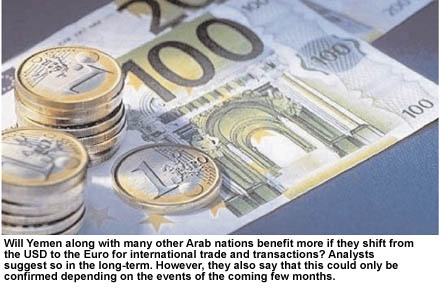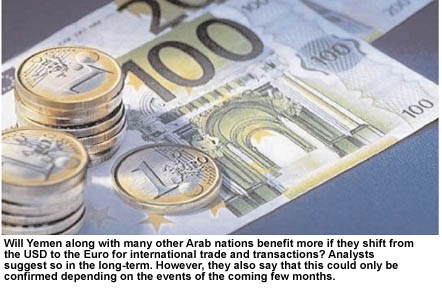
Athens Euro conference has significant Yemen representation: Is our future in the EURO? [Archives:2003/06/Business & Economy]
February 10 2003

BY YEMEN TIMES STAFF
Yemen’s participation at the “Europe, the Mediterranean and the Euro” conference in Athens Feb 3-4 included a, eight-member delegation.
It represented a move to get acquainted with the role the Euro plays at present on world markets and the importance of this currency in future. Recent exchange rates have shown that the Euro is steadily increasing in value compared to the US dollar which is suffering tremendously because of international developments, including the possible war against Iraq.
Results of Euro currency circulation at markets indicates it has become a world currency and a valued unit for saving and also of value in stocks dealings and currency exchange, in addition to funds movement between banks and banking markets.
Yemen in the conference
Despite the fact that Yemen is not a Mediterranean country, the significant number of Yemeni delegates representing the Central Bank of Yemen, universities and the press has shown that the European Commission is counting on Yemen to play an important role in promoting the Euro the region.
The Yemeni delegation was able to get informed on future dimensions of the European currency and its circulation on world markets and its importance in establishing investment and trade partnership between European countries and the Arab world.
The topics discussed in the two-day conference focused on EU-Mediterranean and Gulf relations, how the Euro benefited Europe’s southern neighbors, the implications of an enlarged EU, financial market developments in the Mediterranean and the Gulf, and Euro’s status as an international currency.
It has also discussed issues concerning Arab countries under globalization and dangers embracing foreign currencies, especially the US dollar, which is facing a crisis of losing stability at a time signs of a war on Iraq are causing its dramatic retreat in value on world markets.
The Athens conference has therefore paid much attention to discuss economic premises of interest for Europe and Arab countries. Many statistics, studies, and working papers were provided to support the view that the world is heading towards a Euro-zone.
The statistics provided during the conference say that with 305 million inhabitants, the Euro area population exceeds that of the United States (283 million) and Japan (127 million). On the other hand, the GDP of the Euro area (EUR 6,572 billion) amounts to 75% of the GDP of the United States, but is 225% larger than that of Japan.
Yet, the growth rate of the Euro-zone may be of much concern for the USA as it would constitute a long-term threat for its economy.
GCC and the Euro
The first session of the conference was on the importance of the Euro for the Gulf Cooperation Council (GCC). The session was chaired by Pedro Solbes – members of the European Commission responsible for economic and Monetary Affairs.
The speakers were Karim Nashashibi- International Monetary Fund – senior resident representative for the West Bank and Gaza; Abdeltif Loudyi- Morocco ministry of Finance – Director of the Treasury and Bernand Ziller- European Investment Bank- senior economist advisor.
They tackled issues of European-Gulf cooperation and dealing in Euro in investment and commercial transactions and the importance of the GCC states benefiting from the European experiment in the project of unifying their currency by 2010.
However, the Yemeni delegation raised during this session the question of why Yemen was not included in the statistics and working papers presented during the session.
Pedro Solbes responded by saying that Yemen is “part of the region and has great influence in the economic strategies of the European-Arab relations, however, the conference is open for all countries that are interested in promoting EU-Arab economic relations.”
Euro benefiting Europe’s southern neighbors
The second session was chaired by Jose Manuel Garcia- Margallo Y Marfil- Member of the European Parliament- Vice chairman of the economic and Monetary Affairs committee.
The speakers during the session were Nasser al-Kaud- Gulf cooperation council- Director Money Banking and investment department and Sotirios Kollias – European Commission – head of Unit for Financial and capital investment.
The session focused on the developments in the stock markets in the Mediterranean basin countries and the GCC in order to enhance orientation towards monetary exchange by depending the Euro as a currency receiving trust on world markets. Such developmentd will be useful for the GCC unified currency in future.
The session presented the significance of the Euro for Yemen whether in dealing with this currency in trade exchange with European countries or with the GCC states. The present Yemeni tendency for developing partnership with GCC states necessitates that businessmen have their trust in the European currency and adopt its circulation in the GCC states.
This goal constitutes a monetary gain giving the Yemeni Rial force and capacity for stability away from damage resulting from speculation in dollar in our banking domestic markets.
Euro: Future world currency?
The third and final session of the conference was on the Euro’s future as an international currency as the US dollar. The participants had found the extent of increasing trust the Euro has been entertaining in stock markets and circulation movement in world banks.
The conference had in this premise realized the importance of media in making clear the value of Euro and to gain trust of savers who have no idea about the worldwide value of the European currency and how far security and stability of its price in addition to its benefits for savers and investors.
Athens conference on the Euro coincided with a state of US dollar price fluctuation on world markets with negative indicators of the atmospheres of war experienced by the Arab Gulf region and fears of investors from deterioration of the American currency in world markets.
Banking indicators point that the U.S. dollar in European markets began losing its privilege in favour of four major currencies, i.e., the Euro, the Norwegian Krone, French franc and Japanese yen.
According to experts the Euro has become less open to political tensions and is gaining its strength from economies of the EU countries that most of them are scoring interests in their current accounts and do not depend on foreign investments.
Hence the attention must be rendered to the European currency and there must be an increase in conducting dealings with it in our banking markets and monetary circulation movement, investment, and savings due to the value of saving the Euro is entertaining besides its prices stability.
In conclusion, the Euro seems to go on with strong and solid steps towards an international currency alternative to the US dollar. It is now higher in value than the US dollars and looking at the short period since it was first introduced, one can see that the future is there.
Will Yemen shift to the Euro?
The US economy is weakening, while Europe is growing.
The US has reached its peak in terms of growth and investment opportunities are not that high anymore as most investment fields have been exploited to the fullest. However, Europe is still a growing market as new countries are joining the EU and many of those countries are fertile investment fields full of investment and profit-making opportunities.
The conference has hence concluded that the whole world is seeing that the Euro is the world’s future international currency.
The question is, if the world can see it, will Yemen see it too?
——
[archive-e:06-v:2003-y:2003-d:2003-02-10-p:./2003/iss06/b&e.htm]


